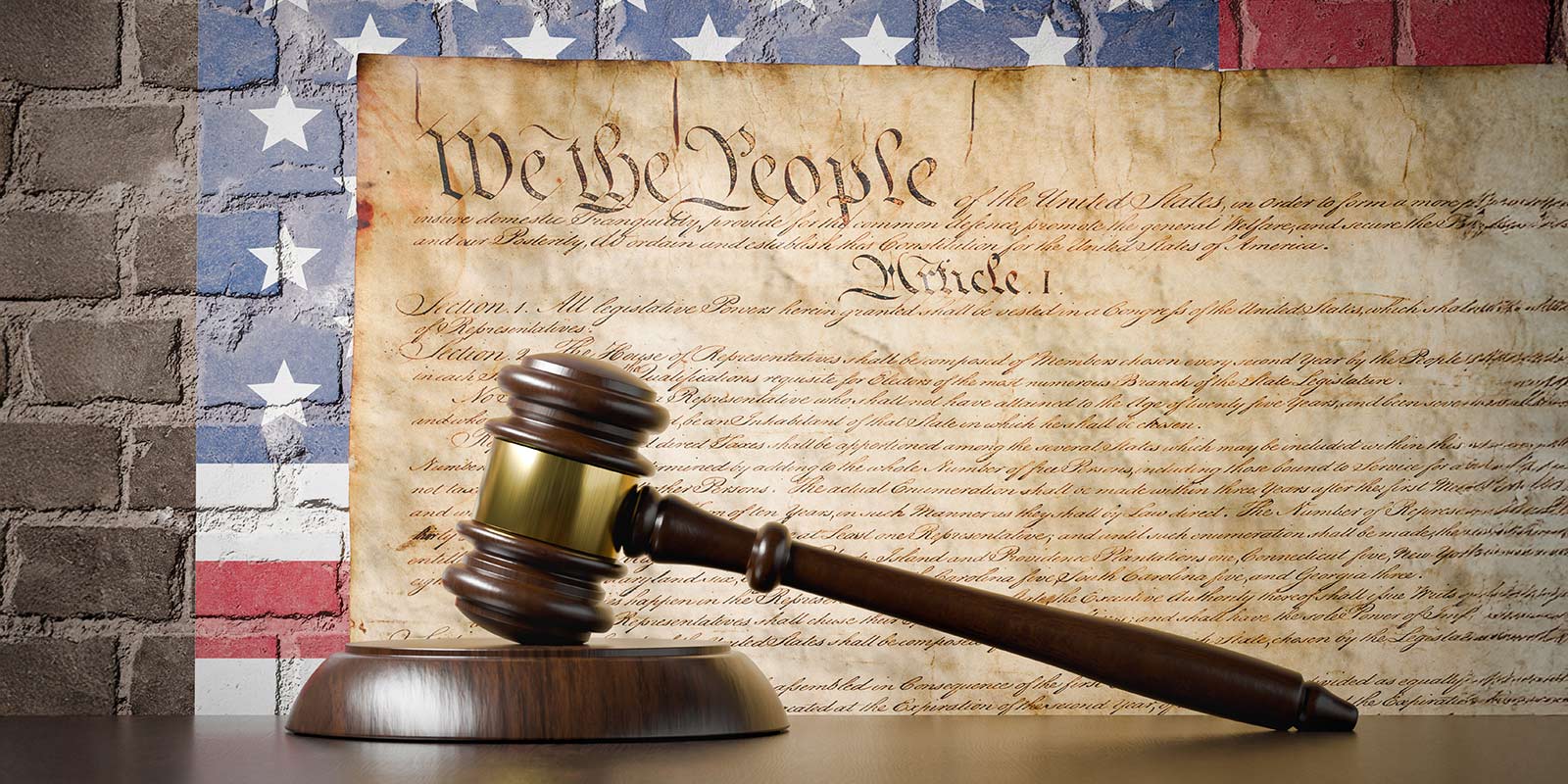What Do We Owe to Posterity?
On June 7, 1776, Richard Henry Lee of Virginia submitted to the colonial Congress a resolution from the Virginia delegation urging the colonies to secede from Great Britain. In the same month, Virginia approved a constitution for itself as a new nation in the world. This constitution is interesting for a number of reasons, including the form of its presentation. The document opens with what has come to be called the Virginia Declaration of Rights, but in the Constitution itself, the Declaration is introduced as a “Bill of Rights.” Following the Bill of Rights we find introduced “The Constitution or Form of Government, Agreed to or Resolved upon by the Delegates and Representatives of the Several Counties and Corporations of Virginia.” This Constitution begins with a declaration of independence from Britain that is remarkably like the American Declaration of Independence the colonies will adopt roughly a month later.
Section 1 of the Declaration of Rights reads as follows: “That all men are naturally free and independent, and have certain inherent [i.e., natural] rights, of which, when they enter into a state of society, they cannot, by any compact, deprive or divest their posterity, namely, the enjoyment of life and liberty, with the means of acquiring and possessing property, and pursuing and obtaining happiness and safety.” Section 2 declares that all power in the government of Virginia is vested in the people of Virginia from whom it is derived, and for this reason, Section 3 declares that government is instituted by the people for their common benefit, protection, and security, and that when a government fails to perform the purposes for which it was created, or does damage to the rights of the people, “a majority of the community hath an indubitable, inalienable, and indefeasible right to reform, alter, or abolish it, in such manner as shall be judged most conducive to the public weal.” What is important to see here is how the first three sections of the Virginia Declaration of Rights hang together. All human beings are naturally free and independent, and for this reason, when we establish a government by common agreement through a compact (which is what our Constitution is), we have no right to divest our posterity of the very right we exercised when we formed the government. Thus Section 2 follows logically from Section 1, namely, that if all people are by nature free and independent, then the power of government must derive from the people. Since this is so, Section 3 acknowledges that when a government is formed, the sovereign power of government remains with the people, and this is why the people retain the right to alter or abolish a government and to replace it with such new order as to them seems proper. The logic in these sections amounts to an argument to the effect that government is a creature of the people, and the people retain at all times the authority to change it. Moreover, and importantly, each generation possesses this authority, which is why Section 1 declares that no generation of Virginians may, “by any compact, deprive or divest their posterity” of the sovereign authority that derives from their status as free and independent persons.
We should pause here to observe that in issuing this declaration of their rights, Virginians were not establishing the conditions of lawlessness in society in which each person is insulated from every other person and immune from the customs and laws of the community. Rather, they acted on the understanding that it is culture, not government, in which we find a way of life that is worth living and defending, and for this reason, we establish government to protect our liberties and our way of life. This was the dominant view of government, north and south, from the establishment of the Union until 1865. The war of 1861-1865 changed this reality by upending the order established in the Constitution and replacing it with a new order in which sovereignty is vested in the central government, and no longer in the people of the states. This is why so many Americans find a description of the older, original American tradition of political order to be strange, and maybe even subversive. In what follows, we will take a look at a particular principle of this older political tradition that was clearly announced in the Virginia Declaration of Rights. The purpose is to uncover the philosophical assumptions that upheld this American tradition.
In 1789, Thomas Jefferson was in Paris serving as United States Minister to France, and on September 6 of that year, Jefferson wrote a letter, ostensibly to James Madison, inviting him to a discussion of a principle of government he found to be of fundamental importance and yet widely neglected. “The question Whether one generation of men has a right to bind another, seems never to have been started either on this or our side of the water.”[i] Jefferson presents his topic in these words: “I set out on this ground, which I suppose to be self-evident, ‘that the earth belongs in usufruct to the living’: that the dead have neither powers nor rights over it” [Jefferson’s emphasis]. Thus the portion of the earth and its produce that belong in life to anyone, cease to be his upon his death and revert to society to be directed to others according to the customs or laws of that society.
“Usufruct” identifies a situation in which someone has the right of use and enjoyment over a piece of property without holding legal title to it. For Thomas Jefferson, this is our proper relation to the earth: while we live, we have the right of use and enjoyment over it, but we do not own the earth because when we quit this life, those who come after us will rightly take possession of it from us. When this happens, whatever right of control we may have had over some portion of the earth ceases to be. Thus the earth does not belong to us as property but is to be ordered and cared for by each generation, understanding that we are obliged by right to leave it ready for use and enjoyment by the next generation. For Jefferson, this is an obligation each generation bears for the benefit of its descendants; it is what we owe to posterity. He then explains two consequences for government that flow from this principle, and in these consequences we see why Jefferson held the “principle of usufruct” to be “among the fundamental principles of every government.” We see also examples of how it is that civic life in a self-governing society makes demands of us for responsible participation in the life of the community.
The first consequence Jefferson finds following from his principle is that no generation may be justified in leaving behind them debts that succeeding generations will have to pay, for in this, prior generations take from existing generations powers over the earth to which they have no right. “Then no man can, by natural right, oblige the lands he occupied, or the persons who succeed him in that occupation, to the paiment [sic] of debts contracted by him. For if he could, he might, during his own life, eat up the usufruct of the lands for several generations to come, & then the lands would belong to the dead, & not to the living, which would be the reverse of our principle.” How might it happen that a living generation could calculate the length of time for which debt is contracted so as to allow its repayment before the next generation takes charge? In order to implement the consequences of the principle that no generation may bind another, we must have a definition of a generation. Using a rather careful mathematical analysis based on life expectancy at 21 years old, which is the age at which people may enter into a contract of government among themselves, Jefferson arrives at the conclusion that a generation in his time is 19 years. Jefferson insists that the practice of requiring those who inherit property from others to pay the debts on the property as a condition of taking possession of it is not like the case of one generation passing its debts to the next. The practice of requiring payment of debt on inherited property is a social convention, and not a matter of natural right, as is the right for one generation to be free of the debts of its predecessor. For Jefferson, each generation stands to the next generation as one nation stands to another, and so just as one nation cannot transfer its debt to another nation, one generation cannot transfer its debt to the generations that follow.
The problem of government debt can be controlled, Jefferson holds, by making it known to lenders that any money borrowed by a government that is not repaid by the end of that government’s term will not be repaid by the next one. In this way, money lenders will become a force for controlling government avarice by refusing to lend money they know will not be repaid. This will compel governments to manage their spending carefully, and it assumes importantly that money remains a market commodity, regulated by the dynamics of voluntary economic exchange, and not the product of government. If the control over money is in government hands, nothing can be done to restrain it. It has long been understood that when the sword and the purse are in the same hands, tyranny inevitably follows. Thus when we ask how we can check the natural impulse of government to grow, we should at the least keep their hands off of the money supply.
The second consequence for government that Jefferson sees following from his principle is that no society can make a legitimate constitution or even a legitimate law that binds succeeding generations without their explicit consent. No generation has the authority voluntarily to adopt a constitution that subsequent generations are bound involuntarily to obey. We have the right to govern ourselves, but this extends only to our persons and our property; the persons and the property of the next generation are for them to govern as they choose. “But persons & property make the sum of the objects of government. The constitution and the laws of their predecessors extinguished then in their natural course, with those who gave them being.” A moment ago, we saw that Thomas Jefferson held a generation to begin as a political society when it agreed to a government, and for governing purposes it expires 19 years later, and the effect of this is that the constitution and laws of one generation expire with them. “Every constitution then, & every law, naturally expires at the end of 19 years. If it be enforced longer, it is an act of force, & not of right.” Thus the constitutions of each generation, and the laws made in pursuance of them, lose their authority, by natural right, when that generation passes.
We find in Thomas Jefferson’s letter to James Madison a principle of government that to many Americans, probably most, would seem inimical to good government. If the laws of one generation expire with them, does this mean that when the next generation rises to governing authority they do so with no laws punishing theft, assault, murder and much else we’d regard as necessary to a tolerable social order? It seems that this would create a space of time in which people can commit acts of mayhem on others without legal penalty because for a moment, no criminal laws exist. The concern is not just for crimes against persons and property, but for the protection of valuable cultural norms like laws governing inheritance of property. We might think that these are laws that apply across generations, and it is good that they do.
We can approach the problem by asking why we rightly regard slavery as a crime even when it is established by law. This implies that crimes are crimes even before human legislatures pass laws punishing them. In our western traditions, law has been understood to be a rule of reason, for the common good, made by responsible authority, and promulgated. In this understanding of law, the true lawgiver is God who created the universe and we human beings within it, and is therefore the ultimate promulgating authority for law. In this tradition there are four types of law: eternal law comprises the ideas in the mind of God by which He accomplishes all that He does and is thus not wholly knowable by us; divine law is that part of eternal law that pertains to us, but which we cannot know until God reveals it to us; natural law is the law of our nature, moral and intellectual, given us by God, and by which we understand how to govern ourselves personally and corporately as a people. This law may be understood by natural reason, without divine revelation. Finally we have human law, but in this framework, human law is essentially the enabling legislation for the natural law. Natural law can control legislative excesses and injustices because natural law is not made, it is discovered, and for this reason, everyone can know it. It is in light of the natural law that we know that human legislation permitting slavery or other crimes is not only unjust, but not law at all because such laws are not rules of reason, for the good of all, which is what the common good is.
The Constitution of the United States is a natural law document, and this fact is seen, for example, in the Ninth Amendment: “The enumeration in the Constitution, of certain rights, shall not be construed to deny or disparage others retained by the people.” The fact that certain rights are set out in the Bill of Rights does not mean that these are the only rights we have. Importantly, the language of other rights “retained” by the people demonstrates that our rights do not come from the Constitution or from government; we possess them by nature, before the government was created, and so government has no authority either to restrict our constitutional rights, or to tell us what additional rights we do and do not have. To make this clear, we have the principle of federalism enshrined in the 10th Amendment: “The powers not delegated to the United States by the Constitution, nor prohibited by it to the States, are reserved to the States respectively, or to the people.” The Constitution does not give to the federal government power, in any of its three branches, either to expand our rights or to contract them, and therefore the federal government has no authority here. The determination of our rights as a matter of government is a power held by the people of each state acting in their various communities and through their state governments.
This is why Jefferson could write that the constitutions and laws of the federal government and of the states should expire every 19 years without fear of murderous anarchy. We know what the law is that governs our relations with one another because it is within us, and in a healthy cultural order, people will use the tested and honored ways of adjudicating crimes and disputes while crafting a new legal order to account for the changing circumstances in which we live. One might assert that this proposal is “utopian” since it can work only among people who are far more like angels than are we flesh-and-blood mortals. Perhaps, but then we are left with the question of how it can be that one generation of Americans has the right to fashion a government as they see fit, but after this is done, succeeding generations are required to deal with the challenges of a governing order they did not create, and to which they did not give consent. Ideas often have logical and practical consequences that take decades if not centuries fully to understand. This is one of the pressing reasons why a free people must be able to discuss and debate among themselves ideas and their practical consequences. In this we see that honestly teaching our history to the next generation of Americans, that is, teaching them who we are as a people, and how competently to think about it and talk about it, are critical elements of what we owe to posterity.
[i] This letter has caused debate among historians who find in it, quite rightly, evidence that Jefferson did not intend the letter for Madison, but for a Frenchman, most likely the Marquis de Lafayette. The diversion is thought to be a ruse to avoid scandal in case Jefferson’s argument in the letter made it into the hands of officials in the French government. We won’t entertain this interesting question here, but for the sake of discussion, will treat the letter as a personal communication from our third president to our fourth one.




